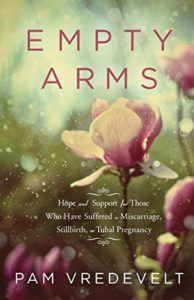Pregnancy Loss
“Maria, how are you doing? You look down.”
“Oh, Julia, not well. I recently miscarried, and I’m sad and confused right now.”
What would you say next? How do you lovingly and sensitively respond to that conversation?
While statistically common, miscarriage and stillbirths are a difficult hurt and knowing what to say or not to say is important to someone dealing with it. A miscarriage is a loss of a pregnancy that occurs before the 20th week. The loss of a pregnancy from week 20 to term is called a stillbirth.
Statistics about Miscarriages
Every year in the United States alone, 600,000 women experience pregnancy loss through miscarriage and 26,000 through stillbirth. Statistics about how frequently miscarriage occurs can be quite difficult to understand. Many miscarriages occur before women even know they are pregnant, and most occur during the first 13 weeks of pregnancy. The rate of miscarriage in women who have missed a period and are then confirmed to be pregnant is generally considered to be 15 to 20 percent. After having a miscarriage, it is common for women to wonder if they will be able to get pregnant and carry a baby to term. Approximately 85% of women who have had a miscarriage will go on to have a successful pregnancy. For those who have two or three miscarriages, 75% will eventually go on to carry a baby to term.
One of the most common questions people have about miscarriage is “Why?” Sometimes this causes women to question and blame themselves. Many times, the reason will simply never be known personally or medically. Other times, by working with your healthcare providers, you may be able to identify the reason(s). Regardless of the cause, having a miscarriage(s) is often an emotionally painful experience.
Emotions after a miscarriage
Matthew 5:4, “Blessed are they that mourn; for they shall be comforted.” Most often, our society does not publicly recognize the emotions women go through after a miscarriage because there is usually no funeral or public notification. The excitement of being pregnant comes to a crashing halt. If you have a miscarriage, you may go through a wide range of emotions at different times or re-experience emotions you have already felt. There is no right or wrong way to move through your emotions. You and your husband may grieve differently, and your friends and neighbors may grieve yet another way. Each individual’s grieving is always different. Grief may include shock, confusion, low self-esteem, feelings of loss of control, denial, disappointment, jealousy, anger, guilt, self-blame, frustration, relief, sadness, and depression. It is highly unlikely you will experience these in any particular order. Learning to live with your loss takes patience and time. Right after the loss, the emotional pain may be very sharp and as months pass, emotions may rise and fall like waves. Remind yourself the varying emotions you are feeling will lessen with time and healing does come. It is important to know that whatever you are feeling is normal and okay.
Things to avoid saying:
In her book on miscarriage, Elise Erikson Barrett shares a number of things to avoid saying to someone who has had a miscarriage.
- Any sentence that starts with “at least.” For example, “At least you are young, you can have another child.” Comments like this invalidate Maria’s loss.
- Overly simplistic spiritual advice. Until Maria and her husband have time to process the loss and experience God’s hand through their loss, spiritual platitudes fall on “raw” ears. As it says in Proverbs 25:20, “As he that taketh away a garment in cold weather, and as vinegar upon nitre, so is he that singeth songs to an heavy heart.”
- Any sentence that tries to come up with a reason for the loss or a way to prevent future loss. “It probably happened because . . .” or “You should…” These comments make Maria feel as though it is her fault for the miscarriage.
- Giving advice or “quick fix” solutions. “You should try to adopt.” It is not the time to make suggestions. Maria’s hurting heart may interpret this as though you have no compassion and said, “If you lost your pet, buy another one.”
Things to say and do:
Romans 12:15, “Rejoice with them that do rejoice, and weep with them that weep.”
Maria needs empathy and support. Saying something like, “Oh, Maria, I am so very sorry,” or “You have my sympathy,” is appropriate. She may want you to give her a nice long hug. She may want you to say, “Would you care to share it with me?” And then be ready to listen – really listen. Offer some specific ways to provide care such as bringing a meal or babysitting. Keeping communication open through calling, sending a card, or emailing regularly is often supportive. Reminding her of comforting Bible verses, songs, or poems is helpful. Ask how you can pray for her. Then pray — really pray. Not only will God hear and respond, but you may be given further guidance as to what to do.
Response to others:
Depending on the circumstances of your pregnancy loss, you and your husband may be the only ones who know about the loss or it may be very public. How do you deal with the reaction of others? It is difficult for someone who has never lost a baby to comprehend what you are going through. Often, people do not know what to say to you. Some people will avoid the topic because they don’t want to upset you. Other times, in their attempts to make you feel better, they may say things that upset you or make you angry. Most people do not purposely try to be insensitive; they simply do not understand the impact the miscarriage had on you.
The best way to deal with other people when you are grieving is to be honest. You might say, “I’m not sure if that’s how I view things, but I appreciate your thoughts.” Some women have found it helpful to write notes to their family and friends telling them exactly what is needed from them. For example, sometimes you may need more interaction with others and at other times you may want to be alone and not talk to others. Others may not understand the depth of your hurt and feelings.
Taking care of your body after a miscarriage
If you have had a miscarriage, you will also need to take care of your body. Your physician will help you determine if there are additional procedures needed to help your body adjust. It is very important to eat a balanced diet, exercise (even if it is just a short walk), drink plenty of water, and maintain a regular rest routine. Besides your emotional reactions, you will also be dealing with hormonal responses as your body readjusts. Depending on how far you were along when the miscarriage occurred, your body will go through some, and possibly all, of the hormonal changes that are normally experienced with a full-term delivery. At times, you may experience mood swings, fatigue, insomnia, inability to concentrate, and/or irritability. Your energy levels and appetite may be erratic. By taking care of your health, you will physically feel better over time.
Specific tools for grieving
Specific things to help you as you go through your grief journey are:
- Write your thoughts in a journal. You might list specific Bible verses and songs that helped you through that hour or day.
- You may want to create special reminders of your baby: write a letter to him/her; make a memory box and put in anything that reminds you of your baby; plant a tree or bush or special garden; make donations to your favorite charity in your baby’s name.
- Find and keep in regular contact with a support group of solid Christian women.
Leaning on God after a loss
2 Corinthians 1:3-4, “Blessed be God, even the Father of our Lord Jesus Christ, the Father of mercies, and the God of all comfort; Who comforteth us in all our tribulation, that we may be able to comfort them which are in any trouble, by the comfort wherewith we ourselves are comforted of God.”
Isaiah 53:3 says Jesus was “acquainted with grief.” This truth can give us comfort and courage to share our feelings with Him. Sometimes after a loss, people feel as though God has deserted them or God is distant. Despite this, do your best to stick to a routine of reading the Bible and praying. It may feel like you are going through the motions for a while. You will realize later God was always with you and at those deepest, darkest times, He was carrying you. Allow the Word to renew you.
Proverbs 3:5, “Trust in the Lord with all thine heart and lean not unto thine own understanding.” God will bring Scripture to you with a new depth of meaning. He will be with you as you go through your grief journey. You will eventually come out of the valley. By His grace you will become a more mature Christian walking more closely in Christ’s footsteps as you discover a “new normal” way of living. God will help you through the darkness. Keep holding His hand.
To view complete PDF, click here.
For Further Information:
 What Was Lost: A Christian Journey through Miscarriage
What Was Lost: A Christian Journey through Miscarriage ![]()
Author: Elise Erikson Barrett
This 165-page book is practical and informative as the author draws from personal experiences and the experiences of others dealing with pregnancy loss.
Empty A rms: Emotional Support for Those Who Have Suffered Miscarriage or Stillbirth
rms: Emotional Support for Those Who Have Suffered Miscarriage or Stillbirth ![]()
Author: Pam Vredevelt
This 90-page book reaches out to those who have been touched by infant death or miscarriage in a unique and compassionate way.
Stillbirth, Miscarriage and Infant Death
This site deals with understanding the grief process when an infant dies. Some of the issues addressed include symptoms of grief, the impact of grief on marriage, coping with family and friends, and subsequent pregnancies. [The Compassionate Friends]
Coping with Grief and Loss
Understanding the grieving process and what facilitates healthy grieving. [HelpGuide.org]
First Candle
No matter how deep your grief and how great your pain, remember that you are not alone. First Candle, along with others who have traveled this road before you, are here to help you through the difficult time following the death of a child. [FirstCandle.org]
Share Pregnancy and Infant Loss Support
Share Pregnancy & Infant Loss Support is a community for anyone who experiences the tragic death of a baby. [nationalshare.org]
The Pain of Infertility Podcast Episodes
This two-part podcast series takes you along the journey of Tyler and Casey Zimmerman as they share their story. Their journey will accent the uniqueness of the infertility pain. It will resonate with the losses that are common among us and it will heighten God’s unique and common love to all His children.





Comments
Leave a Comment